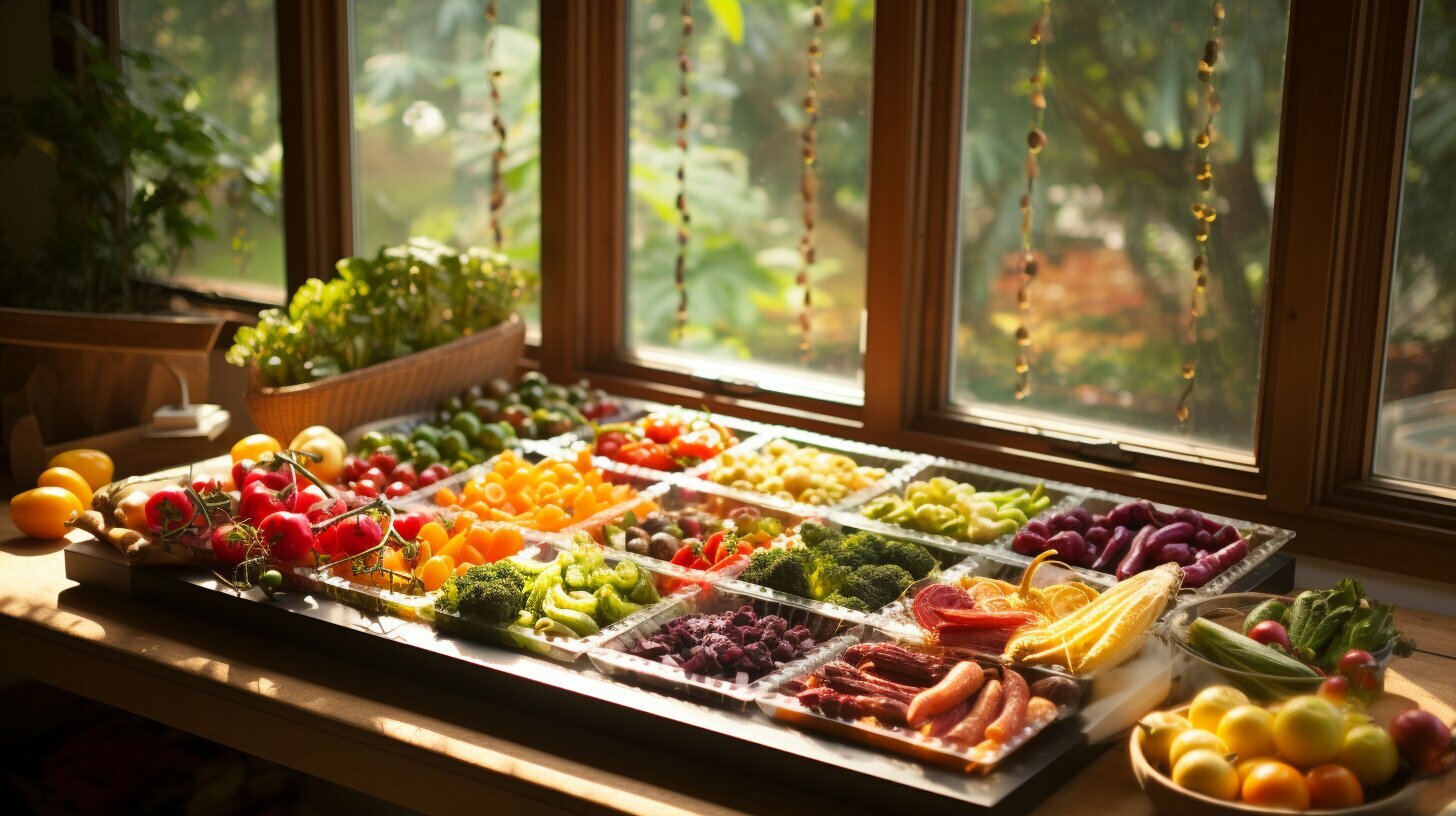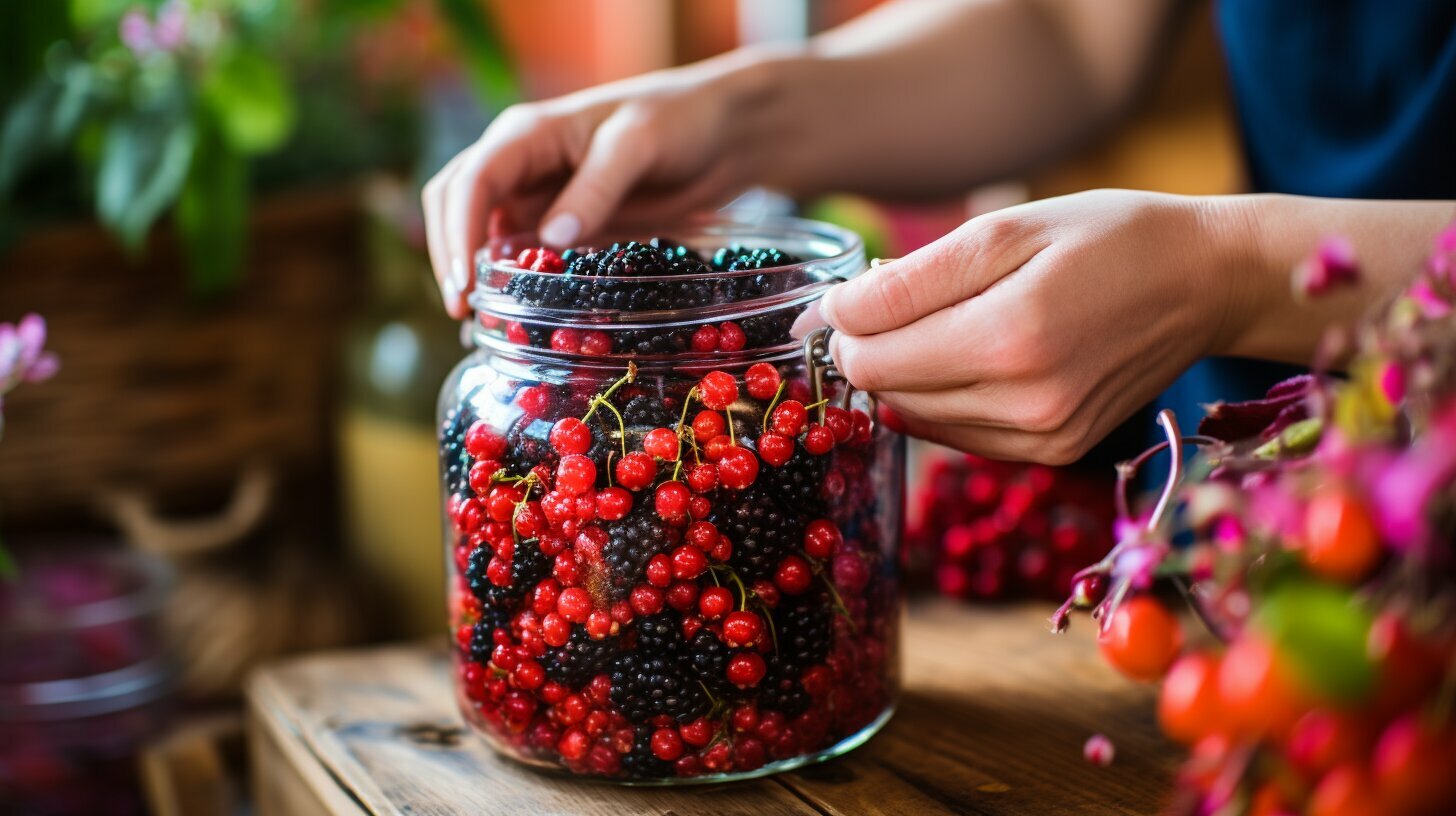Are you looking for a way to enhance the flavor and health benefits of your food while also preserving it for longer periods? Consider dehydrating your food! Dehydrating food is a popular technique that involves removing moisture from food items to increase their shelf life and intensify their flavors. In this section, we’ll explore the various benefits of dehydrating food and why it’s worth considering for your meals and snacks.
Key Takeaways
- Dehydrating food can enhance its flavor and texture.
- Dehydrating food helps to retain its nutritional value.
- Dehydrated food is convenient, portable, and versatile in the kitchen.
- Dehydrating food can lead to cost savings and align with sustainable food preservation practices.
Improve Shelf Life and Reduce Food Waste
Dehydrating food is an excellent method for preserving food and extending its shelf life. The process of dehydration removes moisture, which is a key factor in preventing spoilage and increasing the longevity of various food items.
By dehydrating your food, you can significantly reduce food waste by preventing it from spoiling or going bad before you have a chance to consume it.
Disclosure: When you buy through links on our site, we may earn an affiliate commission.
Dehydrated food is also incredibly convenient for food storage. Unlike fresh produce, dehydrated food takes up far less space, allowing you to store more of it in a smaller area. Additionally, dehydrated food does not require refrigeration, which means you can store it in a cool, dry place for an extended period without worrying about it going bad.
| Benefits of Dehydrating Food for Shelf Life and Storage: |
|---|
| – Extends the shelf life of food |
| – Helps reduce food waste |
| – Takes up less space for storage |
| – Does not require refrigeration |
Whether you’re looking to preserve your summer harvest, reduce food waste, or simply have a convenient and healthy option for snacking, dehydrating food is an excellent choice for food storage.
Enhance Flavor and Texture
Dehydrating food not only offers practical benefits but also enhances the taste and texture of various foods. By removing moisture, the flavors and aromas intensify, resulting in a concentrated, delicious taste. Dried food benefits are particularly evident in fruits, such as apricots, cranberries, and figs, which develop a natural sweetness and chewy texture when dehydrated. Vegetables, such as mushroom and bell peppers, also offer unique textures and flavors when dried.
Dehydrated fruits and vegetables serve as a healthy, flavorful snack and ingredient in various dishes. Dried fruits can be added to oatmeal, cereals, or baked goods, while dried vegetables can be used in soups, stews, and casseroles. You can also enjoy a mix of dried fruits and nuts as a quick and nutritious snack.
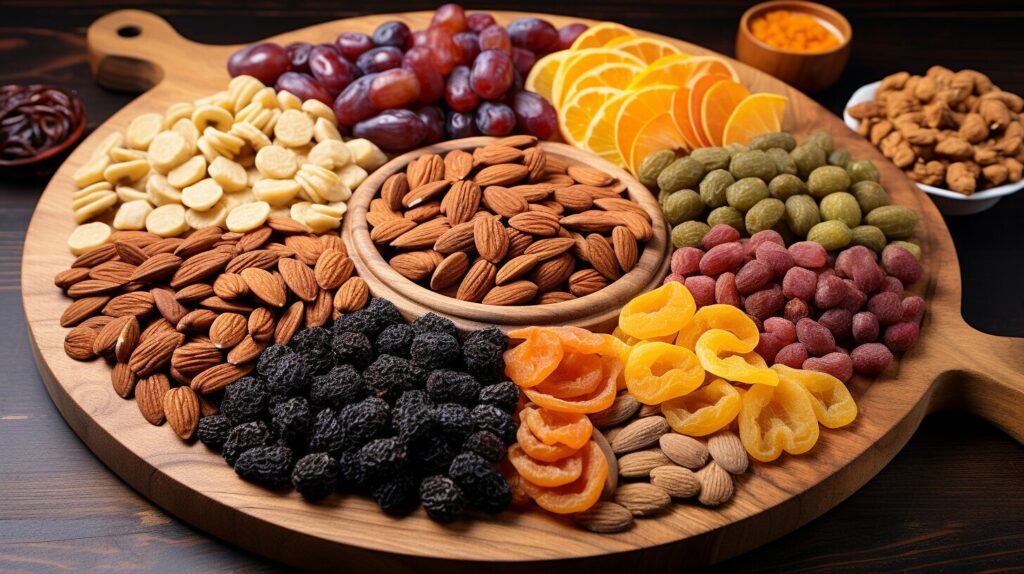
When it comes to meats, dehydrated beef jerky is a popular snack, which also enhances the natural flavors and textures of the meat. The drying process results in a chewy, savory jerky, which can be seasoned with various spices and marinades for added flavor. Additionally, dehydrated herbs and spices offer a concentrated flavor, perfect for adding a boost of taste to any dish.
Retain Nutritional Value
Dehydrating food is an excellent way to retain its nutritional value, making it a smart choice for healthy snacks. Unlike other methods of food preservation, dehydration does not require the addition of preservatives, which can be harmful to your health. Instead, by removing moisture from the food, dehydrating helps preserve the vitamins, minerals, and other beneficial compounds that are present.
In fact, some studies show that dehydrated fruits and vegetables can be more nutritious than fresh ones. This is because the dehydration concentrates the nutrients, resulting in a higher overall nutrient content per serving. Additionally, dehydrated food is lighter and more compact than fresh food, making it easier to carry with you when you’re on the go.
To ensure you get the most nutritional benefits from dehydrated food, it’s important to choose high-quality produce and use proper dehydration techniques. Some fruits and vegetables may require blanching before dehydration to preserve their nutrients.
Convenient and Portable
One of the biggest benefits of dehydrating food is its convenience and portability. Dehydrated fruits, vegetables, and jerky can easily be taken with you on-the-go, making them the perfect healthy snack for busy days. Whether you’re on a hiking trip or need a quick and nutritious snack at work, dehydrated food can be your go-to option.
Dehydrated foods also take up less space than fresh produce, making them a great option for those with limited storage space. You can store them in airtight containers and they won’t take up much room in your pantry or fridge. Plus, since they don’t require refrigeration, you can take them with you wherever you go without worrying about spoilage.
Not only are dehydrated foods convenient and portable, they can also be a healthier option compared to processed snacks. By dehydrating your own fruits and vegetables, you can avoid added sugars and preservatives often found in store-bought snacks. Instead, you’ll have a nutrient-rich snack that is perfect for satisfying your hunger cravings.
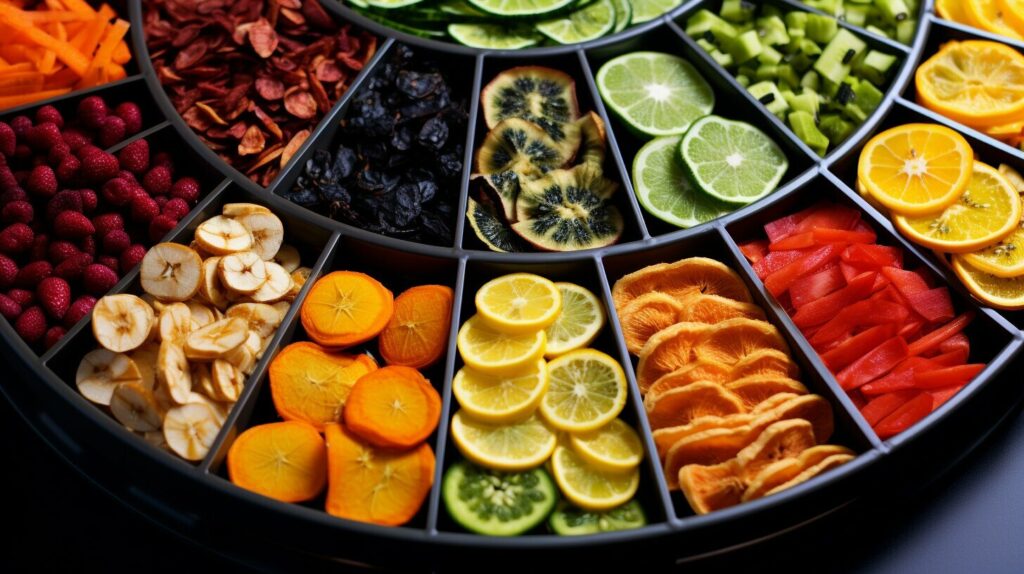
Convenient and Healthy Recipe: Dehydrated Apple Chips
If you’re looking for a delicious and healthy snack, try making your own dehydrated apple chips. Here’s what you’ll need:
| Ingredients | Instructions |
|---|---|
| 4 apples | Preheat your dehydrator to 135°F (57°C). |
| 1 tsp ground cinnamon | Wash, core, and thinly slice the apples (about 1/8 inch thickness). |
| 1 tbsp honey (optional) | In a small bowl, mix the cinnamon and honey (if using). |
| Arrange the apple slices in a single layer on the dehydrator trays. | |
| Brush the cinnamon mixture onto each apple slice. | |
| Dehydrate for 6-8 hours, or until the chips are crisp and no longer moist. |
Once you’ve made your apple chips, store them in an airtight container and enjoy as a healthy snack whenever you need a quick and satisfying bite.
Versatility in the Kitchen
Dried fruits and vegetables are not only great snacks but can also be versatile ingredients in the kitchen. By adding a unique twist to classic recipes or making new dishes, dried fruits and vegetables can add a delicious and flavorful dimension to your meals.
For example, you can make a homemade trail mix with a variety of nuts, seeds, and dried fruits like cranberries and apricots. You can also add dried fruits to salads, yogurt, oatmeal, or even use them as a pizza topping. Dried vegetables such as sun-dried tomatoes and dried mushrooms can add incredible flavor to pasta dishes, pizzas, and even soups or stews.
Another great idea is to use dried fruits or vegetables as a garnish. Dried lemon slices, for example, can add a pop of color to a drink or a dessert, while dried peppers can be used to decorate a spicy dish.
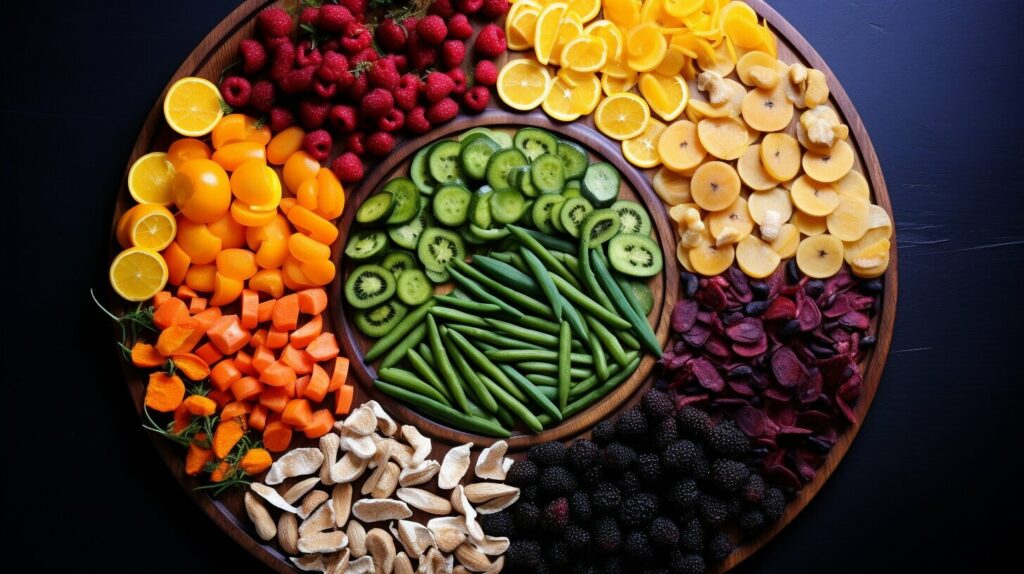
Experiment with different combinations of dried fruits and vegetables and see what delicious creations you can come up with!
Easy Storage and Reduced Clutter
Dehydrated food offers a convenient solution to food storage, helping you reduce clutter in your pantry or kitchen. Unlike fresh produce, dehydrated food can be stored for longer periods without spoiling. This means you can stock up on your favorite fruits and vegetables without worrying about them going bad.
When storing dehydrated food, you’ll want to keep it in a cool, dry place with limited exposure to light and air. Mason jars, vacuum-sealed bags, and airtight containers are all excellent options for storing dehydrated food. If you plan on using your dehydrated food within a few months, you can simply keep it in a cupboard or pantry.
However, if you want to store dehydrated food for longer periods, it’s important to take extra precautions. Consider storing your dehydrated food in a freezer, where it can last for up to a year or more. Alternatively, you can invest in a food dehydrator with temperature control to ensure your food is thoroughly dried and preserved before storage.
With the convenience of easy storage and reduced clutter, dehydrated food is an excellent option for preserving your favorite fruits and vegetables.
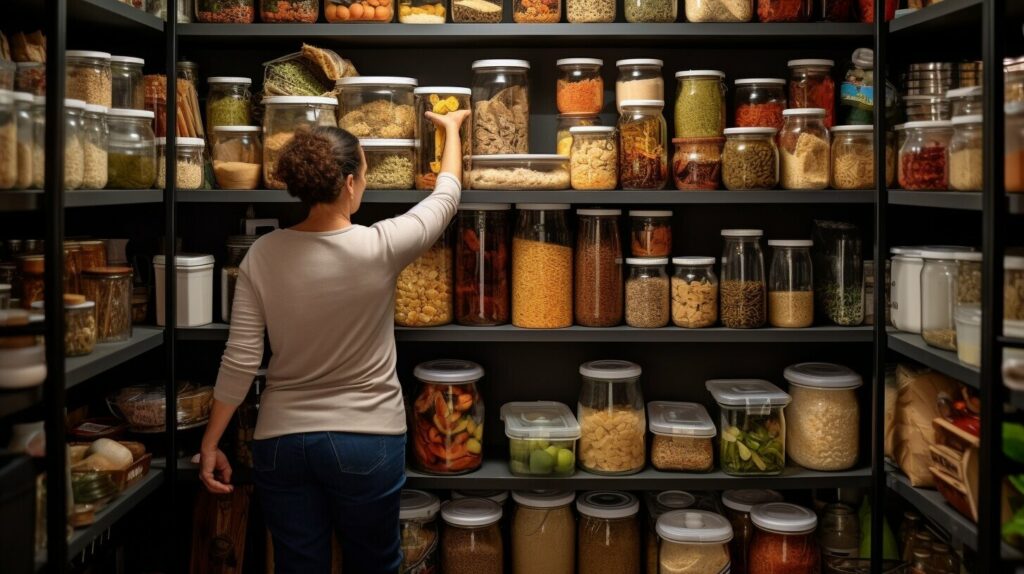
“Dehydrated food offers a convenient solution to food storage, helping you reduce clutter in your pantry or kitchen.”
Cost Savings
If you’re looking for a way to save money on groceries, dehydrating food is an excellent option. By dehydrating produce when it’s in season or buying bulk dehydrated items, you can avoid the need for expensive store-bought alternative, which saves you money. Additionally, you can purchase dehydrated fruits, vegetables, and meats in bulk at a lower cost than fresh produce, which can be costly when out of season.
Dehydrating food is also a great way to extend the life of your groceries, which reduces food waste and saves you money in the long run. With a longer shelf life, you won’t have to throw out fruits, vegetables, and meats that have gone bad before you had a chance to use them.
In summary, dehydrating food is a cost-effective way to preserve your groceries and reduce your food budget.
Sustainable Food Preservation
Dehydrating food is a sustainable method of food preservation that promotes zero-waste practices. By dehydrating excess produce, you can reduce the amount of food waste that ends up in landfills. Additionally, packaging for store-bought dehydrated food often contributes to plastic waste, which can be reduced by making your own dehydrated snacks and meals at home.
Another benefit of dehydrating food is that it reduces the need for refrigeration, which saves energy and reduces carbon emissions. Traditional food storage methods such as canning and freezing require a significant amount of energy to maintain the required temperatures for preservation.
In addition to its sustainability benefits, dehydrated food is also versatile and long-lasting, making it an ideal option for emergency food storage. When stored properly in airtight containers, dehydrated food can last for months or even years, providing a reliable source of nourishment in case of emergencies.
Overall, dehydrating food is a sustainable and practical solution for food preservation and storage. By reducing food waste and minimizing the need for energy-intensive storage methods, dehydrated food helps protect the environment while providing a convenient and nutritious food source.
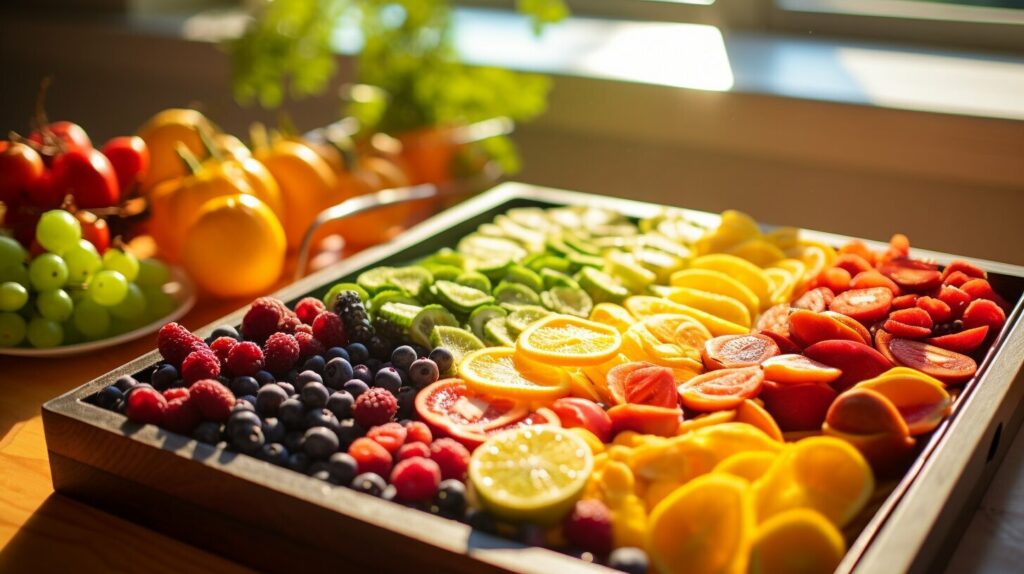
Conclusion
Dehydrating food offers a multitude of benefits that make it a worthwhile option for your meals and snacks. By dehydrating food, you can improve its shelf life, retain its nutritional value, and enhance its flavor and texture. The convenience and portability of dehydrated food also make it an excellent choice for on-the-go snacking or camping trips.
Dehydrating food can also lead to cost savings, as you can dehydrate produce when it’s in season or buy bulk dehydrated items. Additionally, dehydrating and preserving food aligns with sustainable food practices by reducing reliance on single-use packaging and minimizing food waste.
Consider Dehydrated Food
With all these benefits, it’s clear that dehydrating food is a healthy, flavorful, and sustainable option for your meals and snacks. So, the next time you’re looking for a convenient and nutritious snack, consider dehydrated fruits, vegetables, or jerky. You’ll not only enjoy the delicious taste but become a more sustainable and health-conscious consumer.
Unlock the benefits of dehydrating food today and start preserving your favorite foods in a new and exciting way!
FAQ
Q: What is dehydrating food?
A: Dehydrating food is the process of removing moisture from food items to preserve them and enhance their shelf life.
Q: How does dehydrating food improve shelf life?
A: Dehydrating food removes moisture, which is a key factor in preventing spoilage and increasing the longevity of various food items.
Q: What are the benefits of dehydrating food for flavor and texture?
A: Dehydrating food intensifies flavors, resulting in a delicious and concentrated taste. It also creates unique textures, making dehydrated foods enjoyable snacks or ingredients in recipes.
Q: Does dehydrating food retain its nutritional value?
A: Yes, dehydrating food helps retain its nutritional value, preserving vitamins, minerals, and other beneficial compounds.
Q: Are dehydrated foods convenient and portable?
A: Absolutely! Dehydrated fruits, vegetables, and jerky are convenient and easily portable, making them perfect for on-the-go snacks or hiking trips.
Q: How can dehydrated fruits and vegetables be used in the kitchen?
A: Dehydrated fruits and vegetables are highly versatile in the kitchen. They can be used to add flavor to dishes, create unique snacks, or as garnishes in various recipes.
Q: Is storing dehydrated food easy?
A: Yes, storing dehydrated food is easy and helps reduce clutter in your pantry or kitchen. You can explore different storage methods and tips for maintaining the quality of dehydrated food over time.
Q: Can dehydrating food lead to cost savings?
A: Absolutely! By dehydrating produce when it’s in season or buying bulk dehydrated items, you can save money by avoiding the need for expensive store-bought alternatives.
Q: How does dehydrating food align with sustainable food preservation practices?
A: Dehydrating food contributes to sustainable food preservation by reducing reliance on single-use packaging and minimizing food waste.

